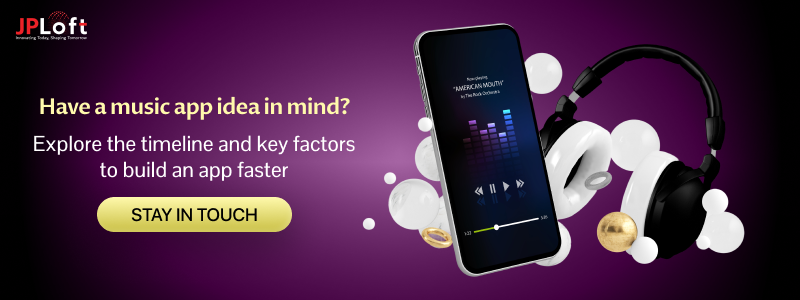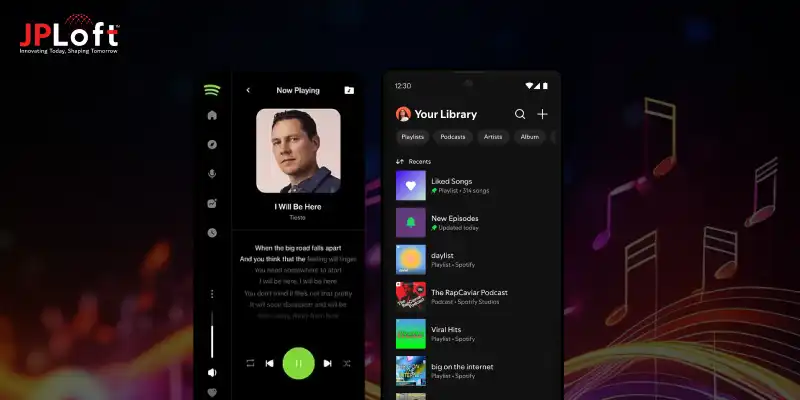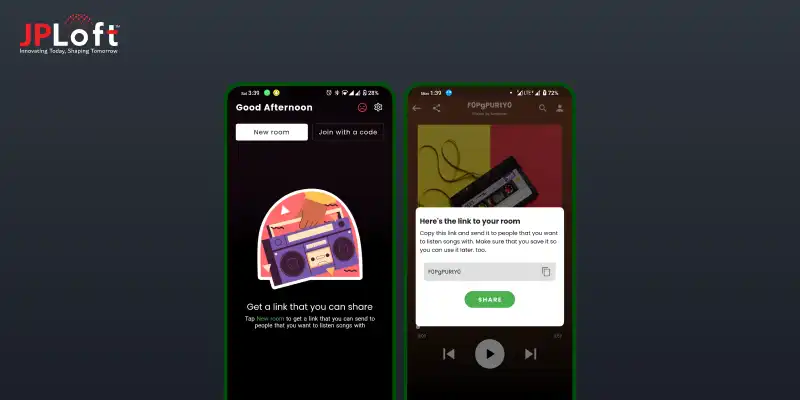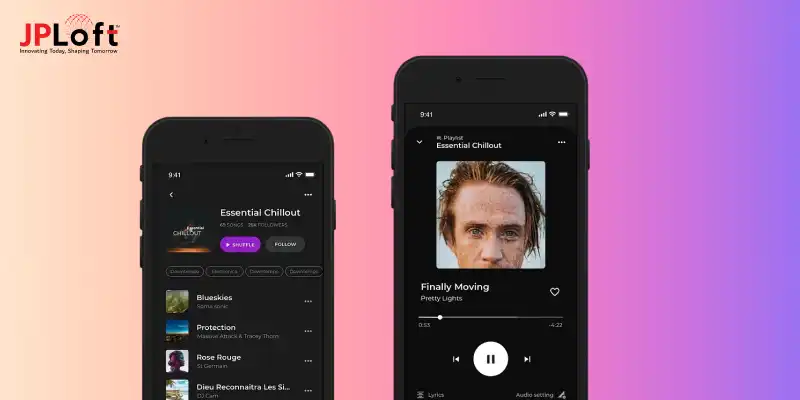Music streaming apps like Spotify and Apple Music have completely transformed the way we discover, enjoy, and share music: anytime, anywhere, and on any device.
If you're planning to build one, the first question that comes to mind is “how long does it take to develop a music streaming app?”
The answer depends on several factors like features, design, platform, and team experience. Understanding the full app creation timeline helps you plan your launch better and avoid delays.
Whether you're developing an MVP or a full-featured app, having a clear music app development time is crucial.
In this blog, we’ll break down the complete app project duration to give you a realistic idea of what to expect.
Market Overview of Music Streaming App
The music streaming industry has seen massive growth in recent years, becoming one of the fastest-growing sectors in the entertainment world.
With more users shifting from downloads to on-demand streaming, the demand for feature-rich music streaming apps is on the rise.
Here are some key trends in music streaming apps that define the current market landscape:
-
- According to Statista, the revenue from music streaming apps is expected to grow steadily at a rate of 4.79% each year from 2025 to 2030, reaching around $44.79 billion by 2030.
- A report by Grand View Research shows that the global music streaming market was valued at $46.66 billion in 2024 and is expected to grow to $108.39 billion by 2030, with an annual growth rate of 14.9% between 2025 and 2030.
- Podcast integration is also becoming a major part of music apps, allowing platforms to serve both casual listeners and long-form content lovers in one seamless experience.
- As per Market Research Future the music streaming market is expected to grow from $33.22 billion in 2024 to $72.5 billion by 2035. During the period from 2025 to 2035, it’s projected to grow at an annual rate of about 7.35%.
- As most users prefer streaming music on mobile devices, apps now combine smooth design with AI-powered recommendations for better engagement.
These trends and statistics show that the music streaming app market is not only growing but also evolving rapidly with technology and user expectations. To stand out, your app must align with what users want today.
Decoding the Music App Timeline – From Idea to Launch
Every successful music streaming app starts with a simple question: “How long does it take to develop a music streaming app?” The truth is, the mobile app build time can range from a few weeks for a basic MVP to several months for a feature-rich, custom music streaming app.
And when we talk about app development time for music streaming platforms, it's not just about writing code. It includes everything from planning, app wireframing, UI/UX design, app prototyping, backend setup, to final deployment.
If you're planning to build a music streaming app from scratch, the time it takes depends on the type of app you want. But the timeline can stretch anywhere from 1 month to 9 months and more.
If you're planning to build a music streaming app from scratch, the time it takes depends on the type of app you want. But the timeline can stretch anywhere from 1 month to 9 months and more.
Here’s a quick view to help:
Estimated Music App Development Timeline:
|
App Type |
Estimated Time |
Important For |
|
Basic Music App |
1–2 months |
MVP launch, testing your music app timeline for startups, market validation |
|
Medium Music App |
3–5 months |
Good balance of features, better user experience, early-stage funding rounds |
|
Advanced Music App |
6–9+ months |
Scalable solution, monetization, brand identity, long-term success |
Delays in the creating music app can impact not only your launch date but can be a reason why music app fails. It’s important to keep a lean approach during the initial phase and slowly build on your app after launching your MVP.
The development time for Android and iOS music apps can also differ slightly due to platform-specific customizations, but most experienced tech teams align both under the same app development time window.
Factors Affecting the Estimated Time of Music App
When it comes to calculating the estimated time of music app development, there’s no one-size-fits-all formula. The music app development time can vary significantly based on technical, functional, and strategic choices.
Here are the major factors that directly impact the app development time for music streaming platforms:
1. Complexity of Design & User Experience
A simple, intuitive interface takes less time to develop than a highly animated, visually rich design. However, investing in strong UI/UX inspired by top music app features helps improve retention and engagement.
Adding interactive elements or advanced personalizations will extend the mobile app development duration for music apps.
2. Feature Set and Functionality
The more features you want such as offline mode, advanced search, playlist creation, and social sharing the more time it takes.
Integrating innovative music app ideas like collaborative playlists, podcast support, or mood-based song suggestions also increases both the app project duration and testing efforts.
3. Use of Advanced Technologies (AI, AR/VR, etc.)
The role of AI in music apps is becoming essential, from personalized song recommendations to predictive content delivery.
However, AI implementation (e.g., machine learning algorithms for mood-based playlists or smart suggestions) adds to the overall app development time.
Additionally, integrating AR/VR (like immersive concert experiences or virtual DJ modes) is cutting-edge, but also time-consuming. These technologies stretch both development and testing timelines.
4. Backend Infrastructure & Scalability
Setting up a scalable backend to handle streaming, data storage, and user management takes time, especially if you're building a solution to support millions of users.
A strong backend architecture is vital for reducing downtime and ensuring smooth streaming. The more scalable your platform, the longer the mobile app build time may be.
5. Platform Choice: Android, iOS, or Both
The development time for Android and iOS music apps can vary due to platform-specific requirements. Native development for both platforms separately takes longer than using cross-platform frameworks but it often delivers a better performance and user experience.
Many of the best music streaming apps in the market, such as Spotify and Apple Music, rely on native builds to deliver seamless interactions, faster loading times, and robust offline functionalities.
Your choice of platform will significantly influence both the timeline and the technical depth of your app.
6. Budget and Team Size
Naturally, the music streaming app development cost also impacts the time frame.
A larger team with experienced developers may shorten the development time for apps, while a small team might take longer but offer cost advantages.
Understanding these factors will help you plan a more realistic app creation timeline and avoid unwanted delays.
Whether you’re creating an MVP or a full-fledged product, aligning your goals with these key influences can lead to faster delivery and better product-market fit.
Music Streaming App Development Stages and Timeline
How long does it take to develop a music streaming app? Well, the answer lies in understanding each phase of the development journey.
Whether you're aiming to create an app for MVP testing or a full-fledged platform with smart features, you need a realistic outlook on the music streaming app development timeline.
Below is a stage-by-stage overview of the time involved in app development, especially useful for founders looking to stay aligned with their music app timeline for startups.
Phases & Estimated Time:
|
Development Stage |
Estimated Time |
Description |
|
Planning & Research |
1–2 weeks |
Define goals, audience, and feature scope |
|
UI/UX Design |
2–3 weeks |
Design a music streaming app that users will love |
|
Backend & Architecture |
2–4 weeks |
Build scalable APIs, servers, and music database layers |
|
Frontend Development |
4–6 weeks |
Develop user interface for iOS, Android, or cross-platform |
|
Integration & Features |
3–5 weeks |
Add streaming, search, offline mode, and more |
|
QA Testing & Debugging |
2–3 weeks |
Check performance, fix bugs, and optimize app flow |
|
Deployment & Launch |
1 week |
Final testing, app store submission, and go-live |
|
Post-launch Updates |
Ongoing (2–4 weeks/cycle) |
Improve features, address feedback, ensure stability |
1] Planning & Research (1–2 weeks)
The first and most foundational step in the development of a music app. This stage includes competitor research, understanding your users, and exploring challenges to develop a music app, like licensing, latency, and streaming rights.
A clear roadmap reduces guesswork and saves time later in the development cycle.
2] UI/UX Design (2–3 weeks)
Here, designers design a music streaming app that’s not just beautiful but intuitive. Wireframes, user flows, and visual designs are created with mobile responsiveness and minimalism in mind.
A good design strategy accelerates development and directly impacts user engagement.
The time required to create a music app often gets extended if this phase lacks clarity, so invest wisely here.
3] Backend & Architecture (2–4 weeks)
The backend is the engine of your music app. This is where custom music streaming app development takes shape by building APIs, streaming servers, music libraries, and cloud integrations.
Whether it’s song storage, playlist syncing, or user authentication, this phase lays the groundwork for scalability and future updates.
4] Frontend Development (4–6 weeks)
This is where your app becomes interactive. The frontend team brings UI to life across Android, iOS, or hybrid platforms. If you plan to integrate AR/VR in music apps (e.g., virtual concert experiences), the timeline may extend.
The app development time for music streaming platforms also depends on whether you use native development or frameworks like React Native or Flutter.
5] Integration & Feature Development (3–5 weeks)
Adding the core features like real-time streaming, download options, advanced search, equalizers, and smart suggestions is the heart of the time to build a music streaming app.
This is where personalization powered by AI, user analytics, and third-party SDKs are integrated. Each feature adds layers to the overall app development time.
6] QA Testing & Debugging (2–3 weeks)
App testing ensures the app is bug-free and performs well under real conditions. Functional testing, UI testing, performance testing, and device compatibility are all checked here.
QA becomes especially important for music apps where lag-free audio playback is non-negotiable. Bugs from this stage could affect your app store ratings significantly if overlooked.
7] Deployment & Launch (1 week)
Once testing is done, your app is packaged for deployment on app stores. This phase includes preparing store descriptions, screenshots, privacy policies, and complying with platform-specific requirements.
If you want to publish your app on the app store smoothly, everything must align with Apple's strict guidelines. Similarly, to submit your app on play store, you’ll need to ensure the APK is optimized, signed, and tested for Android devices.
While it takes just a week to complete deployment, approval times may vary. When done right, this step reduces the chances of rejection and keeps your app timeline on track.
8] Post-launch Support & Updates (Ongoing)
The journey doesn’t end after launch. Regular feedback, performance updates, feature rollouts, app maintenance services and patching vulnerabilities are part of this cycle.
Especially in music tech, features evolve rapidly with trends. Including emerging technologies or user-driven updates may influence ongoing time involved in app development. Agile sprints are best for this phase.
Whether you're building a lean MVP or a feature-rich platform, knowing the time to build a music streaming app gives your startup clarity and structure.
From backend logic to UI animations, each layer contributes to your music streaming app development timeline.
How ML, AI & NLP Can Reduce Music App Development Time?
In the current time, developers face immense pressure to deliver feature-rich apps quickly while maintaining exceptional user experiences.
Traditional app development often involves months of custom coding for recommendation engines, audio processing, and user interface optimization.
However, leveraging machine learning, artificial intelligence, and natural language processing technologies can dramatically accelerate development timelines while delivering superior functionality that would otherwise take years to build from scratch.
A] Smart Music Recommendation Systems
Traditional Approach: Building custom recommendation algorithms from scratch typically requires 6-12 months of development, extensive data analysis, and complex mathematical modelling.
AI-Powered Solution: Professional AI development services provide pre-trained recommendation models that can be integrated in weeks rather than months.
These systems instantly analyze user behaviour, listening patterns, and preferences to deliver personalized playlists.
By leveraging existing AI frameworks, developers can focus on user experience rather than spending months perfecting recommendation algorithms.
B] Automated Audio Processing & Analysis
Traditional Approach: Custom audio processing for features like beat detection, mood analysis, and genre classification requires specialized audio engineering expertise and months of development.
ML-Powered Solution: ML development services offer pre-built audio analysis tools that automatically extract musical features, detect tempo, identify instruments, and classify genres.
These ready-to-use solutions eliminate the need for custom audio processing development, reducing implementation time from 4-6 months to just a few weeks while delivering professional-grade accuracy.
C] Voice Search & Command Integration
Traditional Approach: Developing voice recognition and natural language understanding from scratch is incredibly complex, often requiring 8-12 months of specialized development and extensive testing.
NLP-Powered Solution: Modern NLP development services provide sophisticated voice recognition APIs that understand natural language queries like "play upbeat pop songs from the 2000s" or "find songs similar to my workout playlist."
These services handle complex llanguage processing, accent recognition, and context understanding, allowing developers to implement advanced voice features in days rather than months.
By leveraging professional AI, ML, and NLP development services, music app developers can reduce overall development time by 60-80%.
Tips to Reduce the Time to Music App
Want to speed up your music app launch without compromising quality? Here are a few smart strategies to help you save time during development:
- Start with an MVP: Focus on core features like streaming, playlists, and search. Add advanced features in later updates.
- Use Cross-Platform Development: Frameworks like Flutter or React Native help build for Android and iOS simultaneously.
- Opt for Pre-built APIs & SDKs: Integrate ready-made music APIs (e.g., Spotify, SoundCloud) to save backend build time.
- Hire an Experienced Team: Skilled developers familiar with custom music streaming app development deliver faster results.
- Agile Development Approach: Break the process into sprints for quicker feedback, testing, and iterations.
By following these practices, you can reduce development delays and bring your music app to market faster, smarter, and more efficiently.
Why is JPLoft the Perfect Tech Partner for Your Music App?
If you're planning to launch your own music streaming platform, JPLoft is the partner you can trust. As a leading music streaming app development company, JPLoft brings years of experience, creativity, and technical expertise to every project.
From designing intuitive user interfaces to integrating AI-based music recommendations and real-time streaming capabilities, we build feature-rich apps that users love. Whether you need a simple MVP or a full-scale Spotify-like solution, our dedicated team tailors each product to your goals, budget, and timeline.
We follow agile development methods to keep the process transparent and flexible while ensuring on-time delivery. With us you're not just hiring a developer, you’re gaining a long-term tech partner committed to your app’s success.
Final Wrap-Up
To sum it up, developing a music streaming app requires careful planning, the right features, and a skilled team to bring your vision to life. If you want to stand out in this growing market, focus on innovation, user experience, and expert support.
So, if you're still wondering how long does it take to develop a music streaming app, the answer lies in how well you plan and who you choose to build it with.
With the right development partner, you not only save time but also ensure your app is built to scale and compete in a fast-evolving digital landscape. Take the first step now, and your dream music app could be streaming into users’ ears before you know it.
FAQs
It typically takes 6–10 weeks for a basic app, 3–5 months for a medium app, and 6–9+ months for an advanced version. The timeline depends on features, complexity, and platform choices.
Key features include music playback, user profiles, playlists, search, recommendations, and offline mode.
Yes, building a Minimum Viable Product (MVP) is a smart way to launch faster. It lets you test core features like streaming, search, and playlists before scaling with advanced functionalities.
It depends on your target audience and budget. If you're looking for wider reach, launching on both Android and iOS is ideal. For quicker launch and lower cost, start with one platform and expand later.
A trusted company offers a full-stack team, structured process, quality assurance, and long-term reliability.













Share this blog